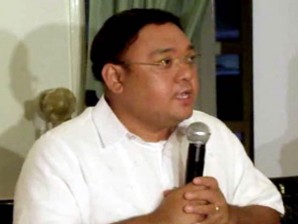Roque: 14 relatives of Maguindanao massacre victims negotiating for settlement
MANILA, Philippines—Relatives of 14 media victims in the Maguindanao massacre have agreed to negotiate for a settlement with the Ampatuans, lawyer Harry Roque revealed on Monday.
The Ampatuans, including former Maguindanao governor Andal Ampatuan Sr., his son former Autonomous Region in Muslim Mindanao (ARMM) governor Zaldy Ampatuan, former Datu Unsay mayor Andal Ampatuan Jr., former Shariff Aguak mayor Datu Anwar Ampatuan, former vice governor Datu Sajid Ampatuan and former Mamasapano mayor Akmad Ampatuan were the principal accused in the massacre case where 58 people were killed including 32 media workers.
Roque, legal counsel for the families of the 17 media victims in the massacre, posted a statement on his blog www.harryroque.com revealing that the relatives of the 14 journalists signed a “written authority” sometime in February for a third party close to the Ampatuans to negotiate a settlement with the accused.
“Under the scheme, the victims were to sign not just a waiver and a quitclaim but also an affidavit pinning the blame for the massacre on Governor Esmael “Toto” Mangudadatu,” Roque said adding that they were not informed of the deal but they got wind of it through sources.
The written authority to negotiate for a settlement was signed last February.
Article continues after this advertisementHe said the deal prompted them to seek redress with the United Nations Human Rights Committee.
Article continues after this advertisementRoque said with the government’s failure to provide the victims of an adequate remedy under domestic law and compensation, the victims will continuously be tempted with schemes that may eventually cause a miscarriage of justice.
Roque explained that the duty to pay compensation to the victims of the massacre is separate and distinct from the civil damages that the Court may order the accused to pay to the private complainants as part of the judgment in the criminal cases for murders.
“The compensation that is due to the victims is because it is the state itself that breached its obligation to protect and promote the right of the victims to live. This includes not just monetary compensation, but also all that may be required to restore the emotional and psychological wellbeing of the victims,” he said adding that they still have a pending motion before the Quezon City Court to order government agencies to provide psycho-social support to the victims.
“Thus far, it’s been almost 4 years and there is still no end in sight to the criminal prosecution of the Ampatuans,” Roque said.
He noted that it even took the government almost four years just to file the information for the 58th Maguindanao massacre victim, Reynaldo Momay.
“This should give us a clue on how long the criminal proceedings will take,” Roque added
Over the phone, Roque said the settlement between the 14 relatives of the Maguindanao massacre victims and the accused would only absolve the latter from their civil liabilities.
“But the accused want the relatives to execute an affidavit saying that Governor Magudadatu was to blame for the massacre. So in that way they want the criminal liability to be passed on to Mangudadatu,” Roque said.
The lawyer said he could not think of how Mangudadatu could be pinned on the massacre when his wife, sisters and other relatives were among the victims of the crime.
Roque said the talks for a settlement stopped in February because the person who was supposed to serve as a negotiator was killed two weeks after the written authority was signed.
The lawyer said he has been planning to go to Maguindanao to gather more information about the supposed settlement and what happened to the slain negotiator.
But one thing is clear, according to Roque, “the 14 relatives are willing to enter into a settlement.”
On Nov. 23, 2009, a convoy of 58 people—including 32 journalists—were on their way to file a certificate of candidacy for governor of political challenger Esmael Mangudadatu, then Buluan town vice mayor, when more than 100 armed men stopped and killed them.
In his blog, Roque, also the chairman of the Center for International Law, said the temptation among relatives to settle with the Ampatuans headed by one of the accused, clan patriarch Andal Ampatuan Sr., became strong because of the government’s failure to provide compensation for the suffering of the victims, which was compounded by the failure of the state to provide a safe environment in which people could freely exercise their civil and political rights.
He wrote, “Unless the Philippine government complies with its duty to pay compensation, the victims will continuously be tempted with schemes that may eventually cause a miscarriage of justice.”
Roque also wrote that his 17 clients would file a communication with the United Nations Human Rights Committee about the government’s failure in its obligation of protecting and promoting its citizens’ right to life for which it should pay the victims compensation and provide adequate remedies under local laws.
“Thus far, it’s been almost four years and there is still no end in sight to the criminal prosecution of the Ampatuans. In fact, the Philippine government took almost four years just to file the information for the 58th victim, Reynaldo Momay. This should give us a clue on how long the criminal proceedings will take,” Roque said, adding that the government’s duty to compensate the victims of the massacre is different from civil damages in court.
“The compensation that is due to the victims is because it is the state itself that breached its obligation to protect and promote the right of the victims to live. This includes not just monetary compensation, but also all that may be required tor restore the emotional and psychological well being of the victims,” he said. With reports from Niña P. Calleja and Jeannette Andrade, Philippine Daily Inquirer
